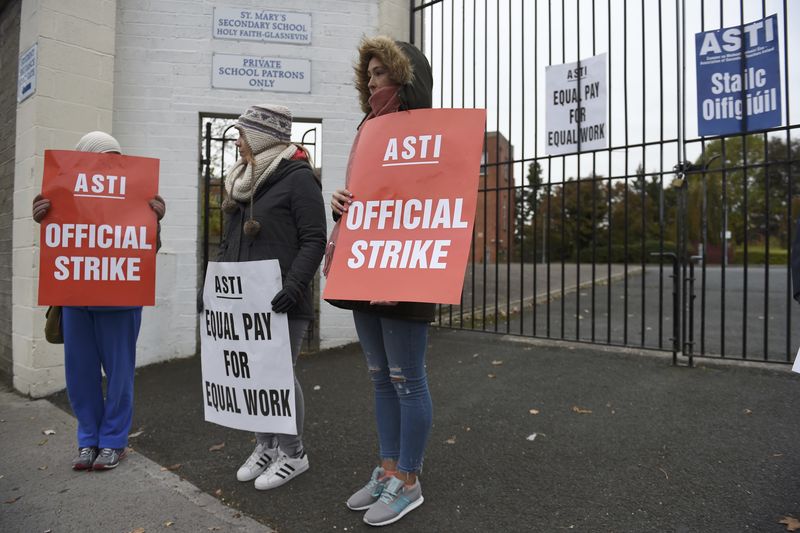By Padraic Halpin
DUBLIN (Reuters) - Irish secondary school teachers went on strike on Tuesday in the latest dispute over pay to test the minority government and put pressure on the country's still-fragile finances.
Ireland was spared the kind of walkouts suffered by fellow bailout recipients Greece and Spain during the financial crisis as public sector workers reluctantly stomached deep wage cuts.
But with the economy recovering faster than expected, calls for full pay restoration are growing.
Almost 20,000 teachers joined the stoppage, a day after a separate action to withdraw supervision and substitution duties threatened indefinite closures and four days after a first-ever police strike was deferred by a last-minute pay offer.
The Association of Secondary Teachers in Ireland (ASTI) said after the strike it had accepted an invitation to mediated talks and would defer further action until the end of November.
With doctors and nurses also balloting for industrial action, the disputes are putting pressure on a deal the government agreed with most trade unions last year to gradually restore some of the pay cuts by 2018.
"The government and in particular the exchequer needs time to make the reinstatement of historic rates affordable and they're not affordable in one fell swoop," Finance Minister Michael Noonan told reporters on Monday.
Many workers feel they have yet to benefit from Europe's fastest growing economy, particularly as living costs rise. A survey on Tuesday showed residential rents, already at record highs, rising at the fastest pace in over a decade.
WARNINGS ON PAY
With the budget for 2017 set and just 1.2 billion euros on hand in 2018 to fund tax cuts and extra spending, Noonan said he could not divert 1 billion euros towards full pay restoration.
Economists warn doing so also risks delaying increases in record low levels of capital spending and reductions in high income tax rates at a time when neighbouring Britain's decision to leave the EU threatens economic growth.
"Once the government gives in on public sector pay, the floodgates will open and that would be bad news for Ireland Inc.," said Alan McQuaid, chief economist at Merrion Stockbrokers.
"The risk is you start to become uncompetitive again and that's the last thing you need against a background of uncertainty around Brexit."
The strikes also represent the biggest challenge to date for the six-month old minority government reliant on the cooperation of the country's main opposition party to govern. At the moment, all sides are standing behind the current pay deal.
"If that was to change the government would find itself in a very difficult position," said Theresa Reidy, a politics lecturer at University College Cork (UCC).

"The budgetary arithmetic is going to get a lot more difficult which is why very few people see this government surviving beyond two years."